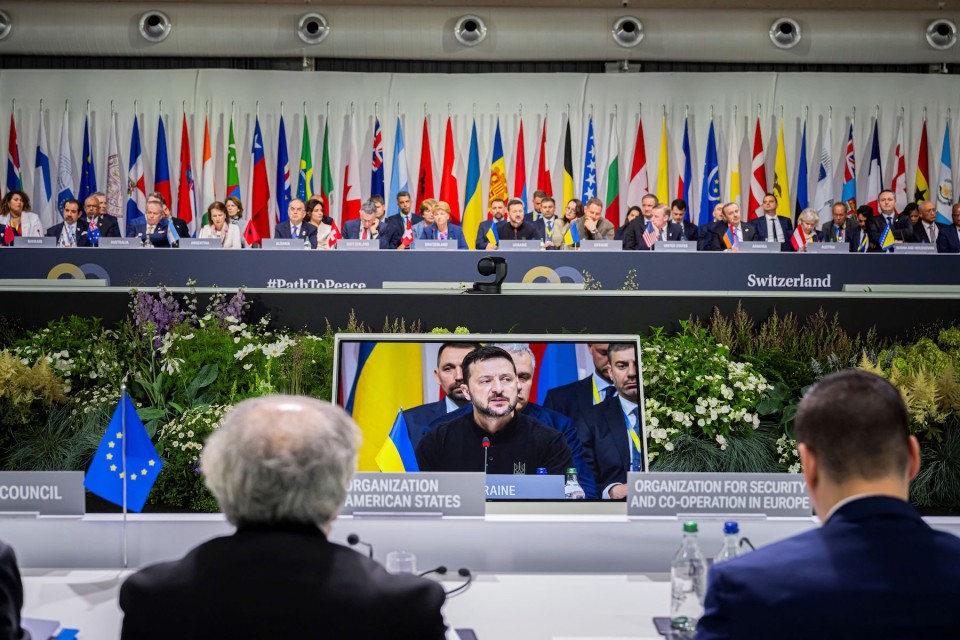Nuclear fears in focus at Ukraine peace summit
Nuclear fears in focus at Ukraine peace summit
on June 16, 2024
More in Europe:

Robin MILLARD
BURGENSTOCK, Switzerland, June 16, 2024 (AFP) – The international Ukraine peace summit focused Sunday on food security, avoiding a nuclear disaster and returning deported children from Russia as countries outlined building blocks towards ending the war.
More than two years after Russia invaded, leaders and top officials from more than 90 states were spending the weekend at a Swiss mountainside resort for a landmark two-day summit dedicated to resolving the largest European conflict since World War II.
After world leaders stood together to offer their support on Saturday, Ukrainian President Volodymyr Zelensky voiced hope of garnering international agreement around a proposal to end the war that he could eventually present to Moscow.
“We must decide together what a just peace means for the world and how it can be achieved in a lasting way,” Zelensky told assembled leaders at the luxury Burgenstock retreat overlooking Lake Lucerne.
The summit, snubbed by Russia and its ally China, comes as Ukraine is struggling on the battlefield, where it is outmanned and outgunned.
On Friday, Russian President Vladimir Putin demanded Kyiv’s effective surrender as a basis for peace talks.
Putin’s call for Ukraine to withdraw from the south and east of the country were widely dismissed at the summit.
But the Kremlin insisted Sunday that Ukraine should “reflect” on Putin’s demands, citing the military situation on the ground.
“The current dynamic of the situation at the front shows us clearly that it’s continuing to worsen for the Ukrainians. It’s probable that a politician who puts the interests of his country above his own and those of his masters would reflect on such a proposal,” Kremlin spokesman Dmitry Peskov said.
Russia on Sunday claimed its troops had captured Zagrine village in southern Ukraine, continuing its progress on the front line.
– ‘Stealing of children’ –
The Burgenstock talks are framed around areas of common ground between Zelensky’s 10-point peace plan presented in late 2022, and UN resolutions on the war that passed with widespread support.
The tight remit was an attempt to garner the broadest support by sticking firmly to topics covered by international law and the United Nations charter.
Countries split into three working groups on Sunday looking at nuclear safety and security, humanitarian issues, and food security and freedom of navigation on the Black Sea.
The session on humanitarian aspects focused on issues around prisoners of war, civil detainees, internees and the fate of missing persons.
It also discussed the repatriation of children taken from occupied Ukrainian territory into Russia.
“We have seen around 20,000 Ukrainian children effectively abducted from their families, community and country. How terrifying a thing is that to say?” Irish Prime Minister Simon Harris told reporters.
“When did it become acceptable for children to be a weapon of war? It is utterly illegal and morally repugnant.
“This is the stealing of children and it’s about time the international community calls it out.”
– Food security, nuclear safety –
Talks on food security examined the slump in agricultural production and exports, which has had a ripple effect across the world as Ukraine was one of the world’s breadbaskets before the war.
Talks will look at not only the destruction of fertile land through military operations but also the ongoing risks posed by mines and unexploded ordnance.
Artillery attacks on ships in the Black Sea have driven up the cost of maritime transport.
“We in the Global South are suffering also the consequences related to food security and energy,” Mexico’s Foreign Minister Alicia Barcena told the summit.
“This war in Europe is posing an existential security threat not only for Europe but for the global community as a whole.”
The nuclear safety group looked at the fragile situation surrounding the safety and security of Ukraine’s nuclear power plants, notably Zaporizhzhia, where all of the reactors have been shut down since mid-April.
Talks honed in on reducing the risk of an accident resulting from a malfunction or an attack on Ukraine’s nuclear facilities.
“This is really a big threat to our security,” said Lithuanian President Gitanas Nauseda.
– Second summit –
Minds are also turning to a potential second summit, at which Ukraine wants to present Russia with an internationally-agreed plan for peace.
Zelensky did not say whether he was prepared to engage with Putin directly in talks to end the conflict, though he has in the past ruled out direct talks with him.
“Russia should join this process because Russia is responsible for the starting of the process that’s called the war,” Georgian President Salome Zourabichvili told reporters.
Croatia’s Prime Minister Andrej Plenkovic said Moscow could join the next summit “if we go in the good direction and the conditions are right”.
But Kosovo’s President Vjosa Osmani said Putin is “not interested in peace. President Putin stands for everything that is against peace, against stability and against good neighbourly relations.”
